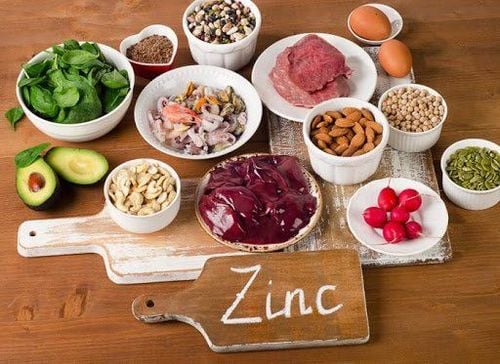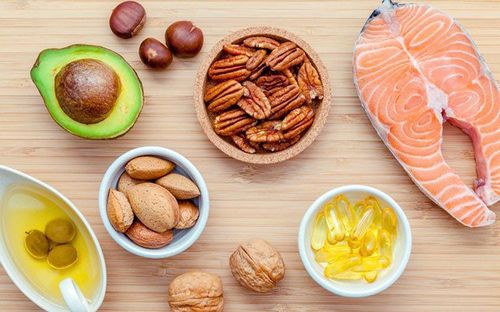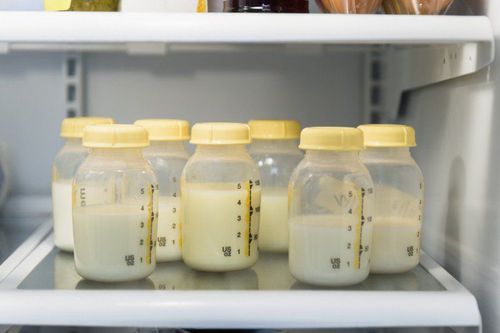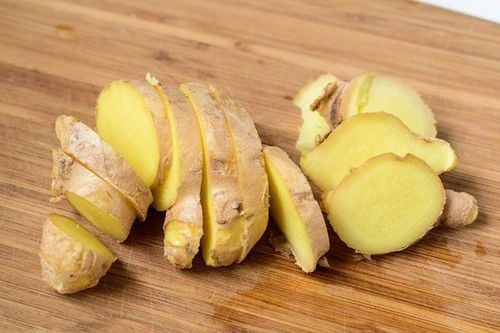1. The Role of Zinc
Zinc is an essential trace mineral. In the human body, zinc directly participates in the production of enzymes, thereby promoting protein biosynthesis. This process supports children's growth in height, muscle development, immune system enhancement, etc.
Accordingly, a well-functioning immune system helps children limit the attack of harmful agents such as viruses, bacteria, and fungi, prevent common illnesses, enhance the sensitivity of the senses such as taste and smell, and help children have a better appetite.
Zinc deficiency is a common condition, especially among infants, young children, and adolescents, as the body's need for this mineral increases proportionally with age. Effective growth and development require smooth protein biosynthesis, which is impossible without zinc. Most enzymatic reactions involved in metabolism and growth require the presence of zinc.
However, unlike other essential nutrients, zinc supplementation is a double-edged sword. Both insufficient and excessive supplementation can lead to abdominal pain, nausea, loss of appetite, digestive disorders, and, in severe cases, impaired growth.
2. Recommended Zinc Supplementation Dosage for Young Children
The required amount of zinc supplementation for infants and young children varies by age. Zinc supplementation should only be considered when clinical signs of deficiency are present and confirmed through biochemical tests or when children suffer from gastrointestinal mucosal damage leading to reduced zinc absorption.
Parents should always follow the guidance of pediatric specialists when supplementing zinc for infants and young children. The recommended daily dosage of elemental zinc for children is 0.5–1.5 mg/kg body weight.
Additionally, the World Health Organization (WHO) provides the following guidelines for zinc supplementation:
- 0–6 months: 2 mg/day
- 7–11 months: 3 mg/day
- 1–3 years: 3 mg/day
- 4–8 years: 5 mg/day
- 9–13 years: 8 mg/day
- 14 years and older:
- Boys: 11 mg/day
- Girls: 9 mg/day

3. Duration of Zinc Supplementation for Children
When symptoms of zinc deficiency appear, parents should take their child to a medical facility or a nutrition center for evaluation and guidance by pediatric specialists. The decision to supplement zinc, along with dosage and duration, should be made by a physician. Generally, zinc supplementation lasts about 2–3 months, depending on the child's condition.
For children with acute diarrhea, zinc supplementation is an essential supportive therapy. Treatment guidelines for acute diarrhea recommend: Children under 6 months: 10 mg of zinc per day, children aged 6–60 months: 20 mg of zinc per day. The supplementation should be continued for 14 consecutive days during the treatment period.
4. Dietary Zinc Supplementation for Infants and Young Children
To prevent zinc deficiency in young children, parents or caregivers should ensure a well-balanced diet incorporating a variety of foods, particularly animal-based foods. Plant-based foods generally contain lower zinc levels with lower bioavailability, making it harder for the body to absorb zinc effectively.The following zinc-rich foods should be included in a child's daily diet (zinc content per 100g of food):
- Oysters: 13.4 mg
- Radish: 11 mg
- Mature coconut flesh: 5 mg
- Green peas: 4 mg
- Soybeans: 3.8 mg
- Egg yolk: 3.7 mg
- Lamb: 2.9 mg
- Wheat flour: 2.5 mg
- Lean pork: 2.5 mg
- Guava: 2.4 mg
- Glutinous rice: 2.2 mg
- Beef: 2.2 mg
- Sweet potatoes: 2 mg
- Peanuts: 1.9 mg
- Rice: 1.5 mg
- Millet: 1.5 mg
- Native chicken: 1.5 mg
4.1. Infants Under 6 Months
The fastest and most effective source of zinc supplementation for infants in this age group is breast milk. Breast milk is a rich source of zinc, antibodies, and other essential nutrients. During this stage, mothers should limit formula feeding and maximize the use of their breast milk to support the child’s optimal development. Therefore, mothers should ensure an adequate intake of zinc and other essential nutrients in their diet to enhance the zinc content in their breast milk.
Pregnant women should incorporate zinc-rich foods into their daily diet, including:
- Animal-based foods: Shrimp, crab, meat, eggs, fish
- Vitamin C-rich foods: Oranges, lemons, tangerines, grapefruits (Vitamin C enhances zinc absorption)
- Legumes and seeds: Especially soybeans…
- Establishing a diet that includes all essential nutrients is an indirect way to supplement zinc for young children.
4.2. Children Over 6 Months
At this stage, infants begin to develop taste preferences and awareness of food. Therefore, parents should diversify daily meals to prevent boredom while ensuring balanced and adequate nutrition.
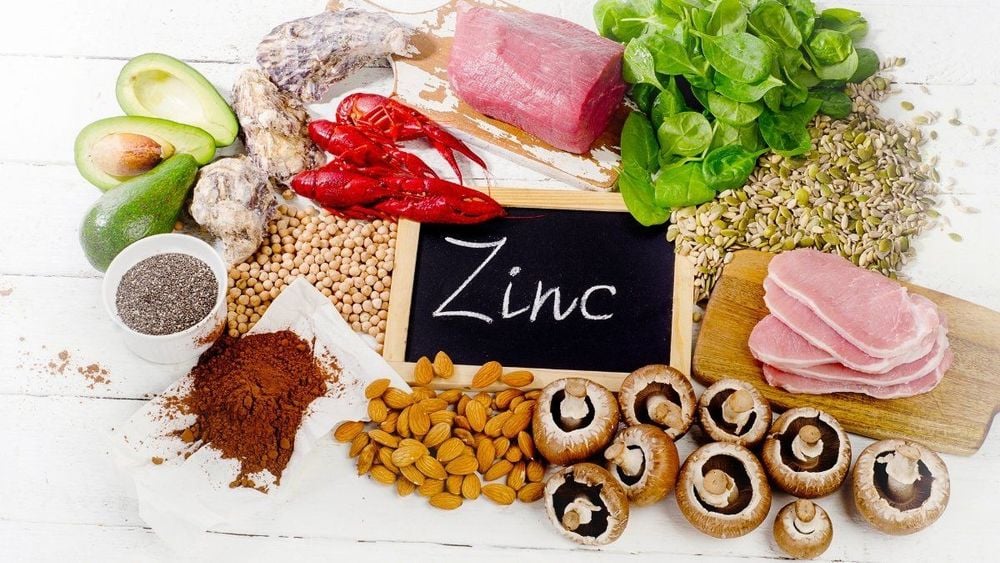
4.3. Children with Malnutrition
Parents of malnourished children should ensure their meals include nutrient-rich foods such as fish, shrimp, eel, crab, oysters, meat, legumes, seeds, and a sufficient amount of green vegetables (e.g., broccoli, bok choy, and even garlic).
4.4. Picky Eaters
Encouraging picky eaters to follow a nutritionally balanced diet can be challenging. To support both appetite and adequate zinc intake, parents should try to accommodate their child’s food preferences.
Some zinc-rich foods that most children enjoy and that enhance appetite include dark chocolate, dairy products (milk, yogurt), seafood, and whole grains.
In addition to dietary intake, zinc supplements can be provided for 2–3 months, after which supplementation should be paused. Parents should also ensure adequate intake of vitamins A, B6, and C to enhance zinc absorption.
5. Key Considerations When Supplementing Zinc for Young Children
- Zinc supplements should be taken 30 minutes after meals.
- Zinc and iron supplements should not be taken together; they should be administered at least two hours apart.
- Zinc and calcium supplements should not be taken simultaneously; zinc should be given at least two hours before calcium.
- To optimize zinc absorption, children's meals should include vitamin C-rich foods and reduced fiber, iron, and copper content.
Zinc is an essential trace mineral, but its supplementation should follow medical guidance to avoid adverse effects.
Zinc is a vital trace mineral. However, supplementing zinc for infants should be done according to the instructions of doctors or nutrition experts to avoid undesirable side effects.
On the market, zinc is used as a micronutrient supplement for the body, and there are currently two types of preparations: synthetic zinc and bio zinc. While synthetic zinc is industrially produced from chemical reactions in pharmaceutical lab factories, bio zinc is entirely naturally derived. To produce bio zinc, scientists extract it from organic food sources, similar to how the body absorbs zinc from food. This process increases the absorption rate of bio zinc into the bloodstream by up to 3.7 times compared to synthetic zinc. Therefore, parents need to ensure that they provide natural sources of zinc so that children can absorb it effectively. In addition to zinc, parents should also supplement their children with other important vitamins and minerals such as lysine, chromium, and B vitamins to help them have a good appetite, a strong immune system, and better resistance to common illnesses.
Other Essential Nutrients Besides zinc, parents should ensure adequate intake of essential vitamins and minerals such as lysine, chromium, and B vitamins, which enhance appetite, strengthen the immune system, and improve overall resistance to illnesses.
Taking zinc supplements for young children should be done 30 minutes after eating; Do not take zinc supplements for young children and iron supplements at the same time, should be taken at least 2 hours apart; Do not take zinc and calcium tablets at the same time, should supplement zinc for young children at least 2 hours before calcium; To optimize the absorption of zinc, the children's menu should add foods rich in vitamin C, reduce fiber, iron and copper. Zinc is an essential trace mineral. However, zinc supplements for infants need to be followed strictly as directed by a doctor or nutritionist to avoid unwanted side effects.
On the market, zinc is used as a micronutrient, used to provide the body with 2 types of preparations: synthetic zinc and biological zinc. While synthetic zinc is produced industrially from chemical reactions in pharmaceutical factory labs, bioavailable zinc is derived entirely from nature. Accordingly, to produce biological zinc, scientists extract it from organic food sources, similar to how the body absorbs zinc from food. This helps to increase the absorption of zinc into the blood of biological zinc up to 3.7 times compared to synthetic zinc. Therefore, parents need to pay attention to supplement biological sources of zinc from nature so that children can absorb it best.
In addition to zinc, parents also need to supplement their children with other important vitamins and minerals such as lysine, chromium, B vitamins,... errands.
For more nutritional knowledge and child care for each age, parents should regularly visit the website vimec.com and make an appointment with the leading doctors, pediatric and nutrition experts of the National General Hospital. Vinmec when needing advice on children's health.
To arrange an appointment, please call HOTLINE or make your reservation directly HERE. You may also download the MyVinmec app to schedule appointments faster and manage your reservations more conveniently.
